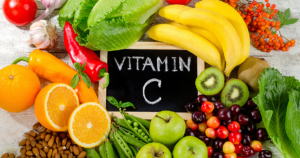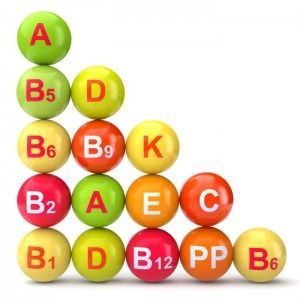Vitamins are essential organic compounds that humans need to consume or produce to continue necessary life functions. They are micro-nutrients meaning that only very small amounts are necessary, although, sometimes even those small amounts are difficult to come by through diet only.
There are six vitamin groups, two of which humans can produce on their own, and four which they must ingest. Because of higher metabolic rates, getting enough vitamins for athletes is critical; there is potential to use up the reserves quicker than the average person. The processes that vitamins perform are extra important for athletes because they not only sustain normal body function, but if those body functions are performing at their peak, they will allow the to recover and perform better.

Vitamin A
The story most closely told about vitamin A is that it helps you see at night. This is true; one sign of a vitamin A deficiency is night blindness. The retina needs vitamin A to see color and in low light conditions. Along with ocular health, vitamin A is an antioxidant, promotes skin health, provides immune support and aids cellular health and multiplication.
Vitamin A is stored in the liver and is fat soluble. Eating the liver of other animals has some of the highest concentrations of vitamin A. It is also available in adequate concentrations in a lot of vegetables, most notably carrots. Because it is fat soluble, it takes a while to flush excess vitamin A from the body making overdosing a possibility if you eat too much liver or take too many supplements.
B Vitamin Group
B vitamins are generally found in large quantities in animal products. Vegans and vegetarians generally need to supplement B vitamins to have adequate supplies. There are a eight different vitamins in the water soluble B group:
- B1 – Thiamine
- B2 – Riboflavin
- B3 – Niacin
- B5 – Pantothetic Acid
- B6 – Pyridoxine
- B7 – Biotin
- B9 – Folic Acid
- B12 – Cyanocobalimin
B vitamins are critical for cell metabolism. They make energy production possible at the cellular level. In turn your body can function as a whole. Each B vitamin produces different coenzymes and has a different chemical structure which is why the group separates into eight different sub-vitamins.
Vitamin C
Vitamin C is commonly known for its immune support functions. It also aids in energy production and is an antioxidant. Most animals synthesize vitamin C on their own; humans are one of the few animals that needs to ingest it however. It is available in many fruits and vegetables which is why its deficiency, scurvy, was so common on long sea voyages. Without access to fresh fruits and vegetables sailors became deficient. It is water soluble making it more difficult to overdose on. That’s why you will see products like Emergen-C with daily servings of over 1000%.
Vitamin D
Vitamin D is one of two vitamins humans can synthesize; it requires exposure to the sun. This is a complicated balance. Too much ultraviolet exposure is linked to skin cancer, but not enough vitamin D is linked to osteoperosis in adults and rickets in children. Lots of foods are fortified with vitamin D because of limited sun exposure. It is fat soluable, although overdosing would require a lot of supplementation. You would likely have a nasty sunburn well before you would overdose from sun exposure.
Vitamin E

Vitamin E is the last antioxidant and also plays a role in neurological function, muscle growth, and gene expression. It is fat soluable and found commonly in many oils, nuts, and seeds. Too much vitamin E can lead to suppression of vitamin K and clotting problems. Not enough vitamin E can lead to neurological breakdown, reduced immune function and cellular destruction.
Vitamin K
Vitamin K is the other vitamin that humans can synthesize on their own. It is necessary for blood clotting and calcium absorption. Deficiency in vitamin K usually comes with other disorders that impair the body’s ability to produce it. In adults, supplementation is not necessary unless there is another disorder.
Vitamins for Athletes
Vitamins in the right amounts help athletes perform at their best. Finding the right balance is necessary so you don’t under or over dose on these compounds that make life and athletic performance possible.